Restaurant Chinese
“The setting is dropped-ceiling bland, with a few plants and paintings for color. This is in keeping with the neighborhood’s restaurant history: 456 resembles nothing so much as a Chinese restaurant in Chinatown.”
— At the corner of Nostalgia and Zen you will find Sam Sifton’s review of 456 Shanghai Cuisine. Oh my God, I am SO HUNGRY RIGHT NOW.
Rental Brokers Are Useless
by Michelle Dean

At the beginning of this month I spent about a week and a half of improbably beautiful, sunny, breezy, vacationing-in-New-York days huddled over my laptop in a borrowed apartment, hitting “refresh” over and over again. I would wake up in the mornings and instinctively reach for the phone (kept next to my pillow) and check my email to see whether anything had changed. I often didn’t shower until 3 or 4 p.m. I survived, largely, on coffee, and I slept at most a few hours a night. I didn’t read the news or even watch television except for that one night the stupor was so thick that I managed to get through four episodes of “True Blood” without actually suffering a brain hemorrhage brought on by excruciating dialogue. This, if I recall correctly, was what having a full-time, soul-destroying corporate lawyer job was like. But this past month I was not working. I was not getting paid. I was just trying to find a place to live in New York this September, in a rising market where the vacancy rate in July was well under 1%.
The wrinkle was that I was trying to do it without paying a broker’s fee. I have rented five apartments in the city, in three different boroughs, and not once have I paid a broker. It’s become a point of pride for me, though this time around I could have been accused of carrying the strength of my conviction to the point of lunacy. I certainly scraped up against the edge of it in August.
After a few days of this, I caved. I contacted a few brokers and tried to commit myself to the notion that I could part with a couple of thousand dollars if it promised to liberate me from this hell. But with one exception, instead of helping me, these brokers mostly toyed with my patience and time. I arrived at one apartment in Fort Greene at 9 a.m. for what I was told was a group showing; upon arrival the broker’s intern told me it had rented the night before. This had not been mentioned when I confirmed the showing by email that very morning. I arrived at another appointment in Astoria with an agent who’d been informed I’d be using a guarantor; after dragging me through two apartments, the agent told me the landlord didn’t accept guarantors. I saw a studio on Montague Street in Brooklyn Heights, and said I’d like to put in an application on it, and even confirmed this by email with the relevant broker. Then, as though we had had a bad Nerve.com first date, I never heard from her again, despite numerous polite — I’m Canadian, remember? — follow-ups. Only one broker of the dozen or so I contacted — this guy — was consistently responsive and courteous. The rest all seemed dedicated to no other cause than preventing me from renting an apartment.
I returned to combing the listings myself; and, in the end, I did manage to rent something without paying 15% of my annual rent (the standard brokerage fee in New York) to a class of professional whose chief skills, it seems, are phone-and-email avoidance and egregious overuse of superlatives. I’m not a cheap or even a frugal person, but there’s something about the idea of paying a broker for performing no service whatsoever that activates my latent skinflint genes. And those genes, lately, have been screaming: “Why isn’t this business model completely goddamn illegal??”
***
When did New York first succumb to the power of the broker? I’m not really sure. Nora Ephron mentions using one in her essay about her first New York apartment, included in New York’s recent collection My First New York: Early Adventures in the Big City. She writes that she rented this place, at 110 Sullivan Street, after graduating from college; that would put the year at 1962, and that’s the earliest mention I’ve found. The customs then apparently deviated little from contemporary practice: the broker reassured Ephron that the apartment was located in “a coming neighborhood, on the verge of being red-hot. He was about 25 years off.” (Yes, the Village — or SoHo, depending on who you ask — once was East Bushwick too.)
Ephron, however, was almost certainly renting in the blessed era before the emergence of the “standard” Manhattan-and-much-of-Brooklyn fee of 15 percent. That amount appears to have been drawn from the market’s hat sometime in the early 1980s. Before that, according to New York Times articles I’ve dug up from the era, brokers usually collected a month’s rent as a fee. Assuming that’s what Ephron paid for her then-$160 a month apartment, with inflation that would come out to just under $1200 today. (Whimper — that was a two-bedroom, and, as of three years ago I was paying over $2000 for a tiny if charming one-bedroom around the corner, on Spring.) If she had had to pay 15 percent that would have been almost $2160 in today’s dollars. Perhaps I know all the wrong recent college graduates, but this strikes me as an absolutely astronomical sum to be spending, at that age, on what often amounts to, on the broker’s end, as a day’s worth of work.
No doubt the more wealthy among you are shrugging your shoulders, thinking your time is more valuable to you than your money. I hardly need to tell you, though, that that isn’t true for all of us. And for some people not being able to afford a broker fee is a major hurdle to being able to obtain an apartment.
Don’t believe me? Well, note that in a recent cut to housing subsidies, the city announced that it would only cover one half of a one-month broker’s fee. Housing Works objected, noting that the policy would “severely inhibit the ability of low-income people to find permanent housing.” From the standpoint of affordable housing advocacy, I’m of course sympathetic to the objecting parties — people using Section 8 vouchers shouldn’t be shut out of the market simply because they require government assistance to secure a roof over their heads. But it’s a very strange thing, in my view, that we find rental brokers so totally natural and acceptable that we don’t even ask why they are even operating at that level of the market, where the potential tenants are so transparently unable to afford the fees.
***
The utter irrationality of the rental broker fee in New York probably explains why, despite some effort, I couldn’t locate any academic work that even bothered trying to justify its existence. My amateurish extrapolation from some of the literature on real-estate brokers writ large (i.e., in sales) seems to go something like this: brokers serve us as “market makers,” providing an all-around benefit by allowing more prospective tenants/owners to meet more prospective landlords/sellers than they could find on their own, and thus maximize their chances of getting the right apartment for the right price. That sounds lovely and useful, of course, but it also sounds nothing like the actual experience of using a broker to rent an apartment in New York.
At some point, in a different kind of New York, it was no doubt true that brokers were necessary to find owners, because most landlords were actually flesh-and-blood individuals. At some point, it was also no doubt true that you needed the broker to facilitate the introduction because your personality was an indication of your creditworthiness. This was a time when there was no central repository of people’s credit information, consultable for $25 and a click of the mouse. But if that city ever existed (and I’m pretty sure it only ever existed for a precious few), it’s gone, now. You’ll hear, on occasion, nervous assurances from friends that to rent directly from someone, with no broker middleman, more or less guarantees you a terrible landlord. But there’s no longer any obvious reason why this would be true.
Meanwhile, the costs of organizing the apartment-search bazaar are now dramatically lower than they once were — which makes it even harder to swallow the high cost of the fees. I could repeat a cliché about the advent of Craigslist, but you know just what I mean. There is less and less reason to need your hand held through the buying process.
If nothing else, the advent of the online ads has made visible just how absolutely venal the whole process currently is. Indeed, Craigslist has likely been just as destructive to the reputation of brokers in New York as it has been a logistical saving grace. On the one hand you can reach a lot of people quickly. On the other, consumers of all types become pretty quickly inured to, and turned off by, breathless assurances that the apartment in question is “SICK MINT++++!!! CALL NOW thsi wont last!”
The New York City Council did a study (pdf) a few years ago and found that almost a third of the no-fee ads on Craigslist were scams, insofar as the apartments did, in fact, carry a broker fee. The main solution that emerged from that brouhaha, apparently, was that Craigslist began charging brokers to list there. The Department of Consumer Affairs investigated a few of the brokerages themselves, but the outcome of their investigation was less than clear cut. And the listings sections are still stuffed to the gills with misleading ads.
***
Until some enlightened legislative soul catches on to the ridiculousness of this whole thing and bans brokering in the rental market outright, there is some good news for us, as renters — namely, that the scams are bumbling and transparent, to an almost endearing degree. There are regional variations: the by-owner ads in Astoria, for example, are especially ridden with listings from brokers who try to game the system by referring to themselves as “agents for the owner.” The Brooklyn ads are more commonly afflicted with multiple brokers listing the same apartment, often one that, if you searched far back enough in the ads, was originally listed on Craigslist as a by-owner — meaning you could simply cut out the middleman if you read the ads carefully enough. This happened with not one but two of the apartments I looked at during my search. In one case, four ads were running side by side for the same apartment: three from a broker and one from the owner. But then, of course: I noticed that. In other words, a certain amount of renter due diligence can avoid this kind of problem (not that it excuses the practice).
And due diligence is what it comes down to when you’re looking for an apartment. Some of it is luck, of course (sometimes even a lot of it). But mostly what it took me was careful searching of the listings and being reasonably quick on the draw on email. I probably would have had an even quicker time if I was using sites like nybits.com, which aggregate rental-company listings — but most of those services were out of my price range.
And all those dark mutterings you’ll get from New York friends about the risks of skipping the broker can be traced to two thoroughly unreliable sources. One is the brokers themselves, who you can find trolling things like the Streeteasy user forums, repeating their doomsday refrains, always without actual examples or evidence. The other is the crush of the self-serving New York narrative that makes the difficulty of renting here stand in as some kind of test of personal mettle. I, too, have derived cocktail party mileage from New York real-estate battle stories (not to mention this piece itself). But if the result of being so proud of our overcoming real-estate adversity is thousands of dollars, paid out to an industry that in any other circumstance we would probably call predatory, we aren’t building character. We’re adhering to a much older, and more venerated tradition of New York-style capitalism: being the chumps who get cheated and then claiming that we actually like it.
Michelle Dean’s writing has appeared, among other places, at Bitch, The American Prospect and The Rumpus. She sometimes blogs here.
Photo by littleny, via Shutterstock.
Squirrel Frenches Toy
Here you will find a picture of a squirrel making out with a plastic dinosaur.
Rival Beekeeping Gangs Throw Down In Savage Conflict

“Tropical Storm Irene moved through New York City on Sunday knocking out power, causing flooding in some neighborhoods and knocking over many trees. In one corner of Fort Greene Park in Brooklyn, the storm also set off a fight — over bees. In a gale wind from the storm, a hollowed-out branch of an enormous tree was ripped off, exposing a hive of 30,000 to 40,000 honeybees. The hive’s discovery was a jackpot for the beekeeping community and word spread quickly on Facebook and Twitter that a feral hive was up for grabs. Two beekeepers jumped at the chance to claim the bees, unknowingly setting off a feud between two of the city’s main beekeeping groups.”
— Of course it did.
Jack White Produces Insane Clown Posse Mozart Cover
Okay, Summer of 2011, this is how you’re going out? Fine. “Jack White has teamed up with Detroit horror-rappers Insane Clown Posse for a new single on White’s Third Man Records. According to White and the ICP, the A-side ‘Leck Mich Im Arsch’ is based on a lost piece of music penned by none other than Wolfgang Amadeus Mozart. (The title translates to ‘lick me in the arse.’)” You can hear the track here. Do note that it includes the lyric, “Call it a fetish/call him a freak/call him in need of a tongue on his buttcheek,” which is straight out of the Cole Porter playbook.
Laura Dern Is Our Only Hope For Bringing David Lynch Back
by Seth Colter Walls
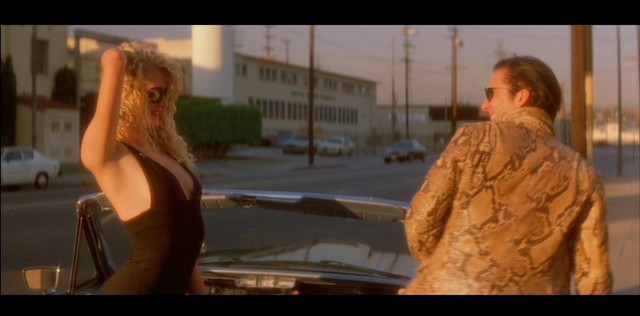
The first in a series on collaborations that we now take for granted but initially made little sense.
Fans of David Lynch are accustomed, by now, to the half-decade wait. It took five years after Twin Peaks: Fire Walk With Me unjustly bombed out of theaters in 1992 before we received Lost Highway. Later, once Mulholland Drive completed its strange, tortured path to realization — from stillborn network teevee pilot for ABC to a New York Film Festival premiere! — Lynch’s IMDB page indulged another similar gap when it came to feature-length projects. That streak of inactivity was only broken when INLAND EMPIRE smeared its digital abstractions and idiosyncratic willfulness (all-caps title included) across screens on the festival circuit.
Now we’re five years on since that work — and we haven’t heard a whisper of a rumor about a new film. During Lynch’s last five-year-itch interregnum, there was at least a sliver of web-based innovation to tide us over; if he couldn’t find funding for features, Lynch could be depended on to produce a goofy, Flash-animated series for his website. This time, the filmmaking lag has been filled up with campaigns on behalf of transcendental meditation, homespun coffee branding and, yes, that dance album slated for a Nov. 8 release.
Given this, it was far from weird for anyone to have wondered whether Lynch had unofficially quit the cinema. Then, earlier this month, Abel Ferrara went and made it ever so slightly more official, in an interview with IndieWire. “[David] Lynch doesn’t even want to make films anymore,” Ferrara said, while ranting about how his generation of directors had lost the plot. “I’ve talked to him about it, OK? I can tell when he talks about it. I’m a lunatic, and he’s pushing transcendental meditation.”
It’s easy to imagine a group of cineastes organizing in response to this news, with the hopes of dreaming up the contours of a lobbying campaign that might get Lynch thinking about movies again. Though, without Laura Dern on board, any such campaign would probably be pointless. The story of Lynch’s career can be told in large part through his various collaborations — think Kyle MacLachlan’s brilliant-naif detectives, Jack Nance’s furrowed-brow weirdos, or Angelo Badalamenti’s soundtracks, pitching back and forth between pop smooches and synths of doom — but Dern’s contribution to his career is as unequaled as it is unsung. She not only gets him, she’s helped him get why he cares about the non-painterly aspects of moviemaking, like story and character.
Though she appears in only three of his features, Dern has worked in every decade of Lynch’s activity but one (the ‘70s), and at every stage of his career (save film school). At the same time, Dern has offered Lynch a dramatic range that no other actor in his company can touch. For a writer so often resistant to traditional storytelling structures — as well as one who sometimes reveals, ahem, a limited approach to female characterization — Dern’s dramatic flexibility and radical alertness to shadings of performance have saved Lynch’s ass once or twice, and educated it in the process.
***
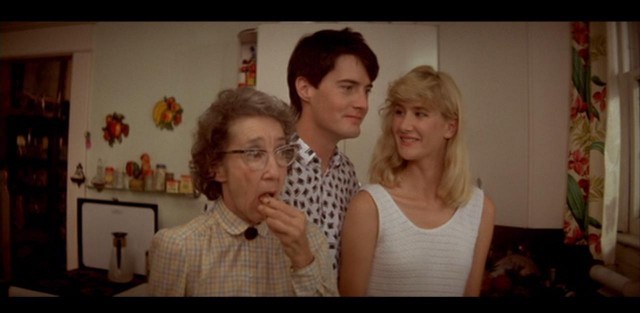
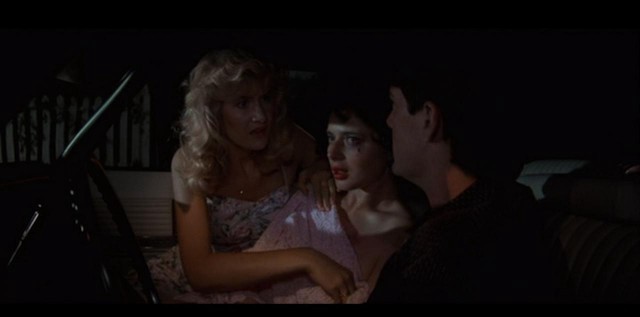
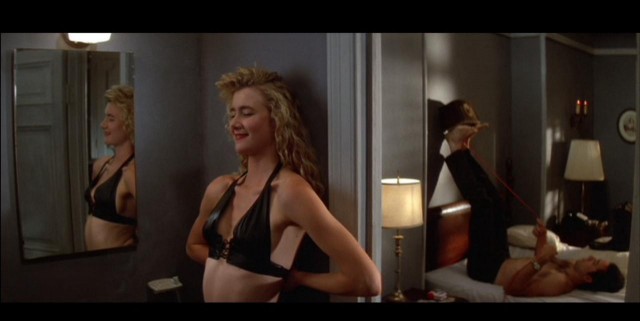
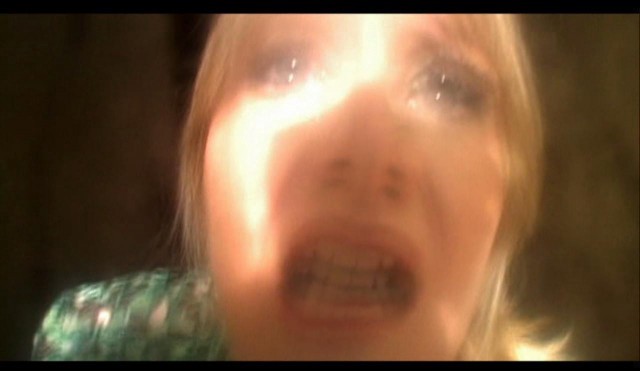
Feminist critiques of Lynch’s work can point toward not just the ritual degradation and sexual violence visited upon the likes of Dorothy Vallens and Laura Palmer, but how unknowable these characters can remain, despite all the trials we see them endure. “Twin Peaks” was a drama about the few thousand different ways a raped and murdered high-school homecoming queen was perceived in a town of a few thousand residents. A fair enough lens on small-town life, taken by itself. (And again, Fire Walk With Me balances out the TV show’s approach and concerns — you should watch it, though only after you’ve taken in the whole series!) But if too many of these women turn out to be ciphers, we might eventually begin to identify a blind side in the filmmaker’s field of vision.
Who exactly is Patricia Arquette in Lost Highway, anyway? More to the point: does Lost Highway direct us to think that the answer to this question is at all important? It doesn’t matter whether she’s a mysterious and chilly brunette housewife or a blonde-bombshell porno actress: Arquette is so pulchritudinously Other she’ll make a man’s head go into meltdown mode, literally (what with Bill Pullman’s skull dissolving down to the brain cavity and building itself back up as Balthazar Getty). It’s as if the movie is telling us some women are too hot to ever be known. Better to become an entirely new man after messing with that kind of femininity-as-weapon.
Dern has never fallen into this trap in a Lynch movie, even when playing a sex kitten. Barry Gifford’s source novel, Wild at Heart, conceived of Lula Pace Fortune as a sexual being, but Laura Dern rendered that trait on-screen in such a way that her straightforward experience of ecstasy would not overwhelm the other aspects of being an adult in the world. Dern’s Lula doesn’t just get to enjoy the highest ratio of orgasms to assaults in the entire Lynch universe, she still possesses a working facility for empathy — be it when comforting a not-long-for-this world victim of highway carnage, or when she just wants Nicholas Cage’s Sailor Ripley to switch off the damned, death-obsessed news already.
Dern got the movie’s operatic, titular line: “This whole world is wild at heart and weird on top.” That the line is delivered during one of the few mature adult conversations between lovers in a Lynch movie isn’t an accident, either. While it’s a big, over-the-top moment, emotive in a soap-opera fashion, Dern also makes it communicate dramatically, as her despair in this scene makes Sailor’s forthcoming attempts at problem-solving understandable, even if they aren’t particularly advisable.
In Blue Velvet, it’s also up to Dern to carry the film’s riskiest emotional moment, when she delivers her “dream of the robins” speech to MacLachlan’s Jeffery Beaumont. In that scene, the snarky opportunity for audience laughter comes with MacLachlan’s cheese-faced reaction to Dern’s idealism. But her conception of a perfect world — a vision held out to counteract the film’s darkest, Dennis Hopper-on-nitrous depths — needs to seem something other than just risible. And selling that quality is all up to Dern; just as it’s up to her to nudge the audience to accept Jeffrey’s spy-boy antics, when she says she’s not sure if he’s a detective or a pervert (while subtly suggesting that it might be okay with her if it turns out that he’s got some pervert in him). Dern’s Sandy might seem virginal compared to Isabella Rosselini’s Dorothy, and she might even be shocked to learn that her college-boy crush put “his disease” in the lounge singer, but even that’s not so disappointing a revelation that Sandy won’t rush to aid the other woman when she’s naked and covered in bruises. In these movies, Laura Dern is always down for some real grown-up behavior, be it moral or erotic.
***
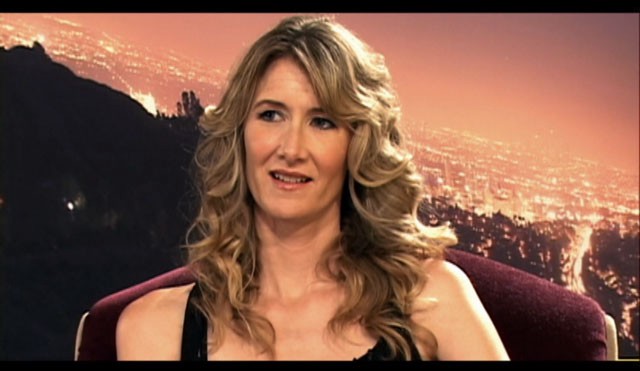
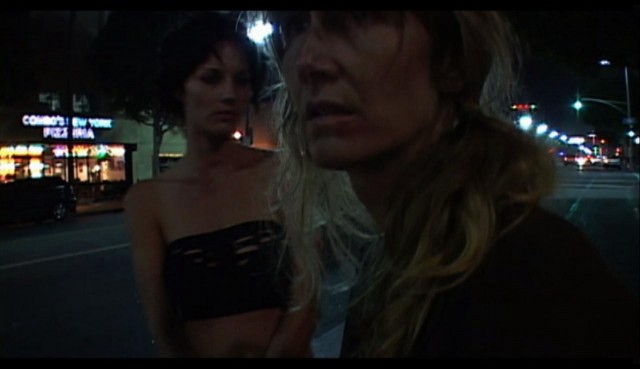
Aside from her bravery and flexibility in front of Lynch’s camera, it’s impossible not to acknowledge Dern’s similar steadfastness behind the scenes. The director gave her co-producer credit on INLAND EMPIRE for more than sentimental reasons; Dern’s forbearance over a multi-year period of staggered shooting was the only thing that made his three-hour fever dream possible in the first place. (It seems likely that Dern passed on at least some higher-paying work so she could remain on call for Lynch during this time.) “Every time he got an idea for a scene, we would shoot it, and he wrote the script through the course of this time,” Dern told reporters upon the film’s release.
While it’s difficult to speak super-definitively about what happens in INLAND EMPIRE, even after one has written out a lengthy, Wikipedia-style summary of its scenes, the film’s detractors ought to concede that, to whatever degree it all hangs together, it does so because of Dern. Does she read on the screen, during her early scenes, like an A-list movie star who is winning at the game of Hollywood, even if she’s being shot on consumer-grade digital video? Yup. Does she howl with the best of avant-cinema’s most tortured souls, whilst being chased down L.A.’s Skid Row streets at dawn by an angry passel of ladies of the night? Of course she does.
Dern seduces, and Dern repels; her character in INLAND EMPIRE frolics wildly under the covers while forgetting whether she’s playing a character in the movie-within-a-movie or if she’s just being herself. But through all this, Dern roots Lynch’s flights of abstraction in behaviors — most often derived out of fear — that feel recognizable to us. Only she can save Lynch’s three-hour abstraction from fully losing its own mind, its identity as a movie — and he knows, it, too. Even though there is no “dream of the robins” speech or “wild at heart and weird on top” movie-summing-up aria for Dern to sing, she’s still called upon to identify and resolve the movie’s central tension: It’s only when Dern walks into the strange room where a woman has been trapped, watching part of INLAND EMPIRE on a television, that the imprisoned viewer (and real-life audience) is granted an escape from whatever spectral demons have been haunting our viewing.
After working equally well with Lynch in his early, indie-style ascent, his mainstream pop period and now during his late-career explosion of his own practice, Dern’s qualifications for inspiring the director to try something new are beyond unique. Assuming Abel Ferrara’s perception of reality is correct (not always a given with self-described “lunatics”), and Lynch thinks he’s done with movies, here’s hoping Dern is already hard at work persuading Lynch that other creative possibilities still lie beyond the dance floor.
Seth Colter Walls writes for lots of places, including his Tumblr.
A Fresh Foot: The Great Canadian Severed Feet Mystery

“Tuesday’s discovery marks the eighth foot to be found on the B.C. coast since August 2007. Three more have washed up in nearby Washington…. All of the feet discovered so far have been in running shoes.”
— But who are missing the feet?
Yeah, here’s the Wikipedia page, Encyclopedia Brown. (via)
Panda Poop Will Save The World

“Giant Pandas are well-loved for their distinctive appearance and sedentary nature. Now they will receive even greater adoration and attention for their bowel-based contribution to the development of a clean energy future. In a national meeting at the American Chemical Society, researchers presented a study identifying panda poop as a source of enzyme-producing bacteria that breaks down plant materials in a way that is useful for biofuel production.” [Via]
Photo by Hung Chung Chih, via Shutterstock
How the Media Treated Mexico's Mass Murder
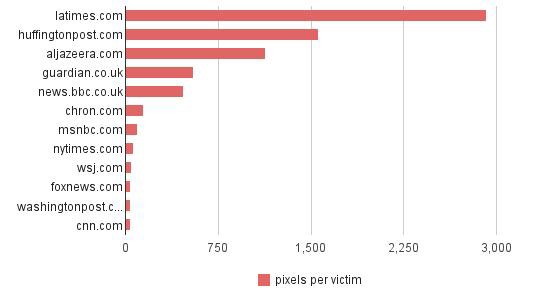
Last week, 50-some people were murdered in the torching of a building in Mexico, in Monterrey. (People were trapped in the casino after gunmen stormed the building; they were ordered out but many panicked and ran to the second floor.) Here’s a look at the amount of front-page web real estate given to the event by English-speaking news organizations, as expressed in the formula of pixel-per-victim. (What the analysis doesn’t take into account is the depth or complexity of coverage, and also the amount of play, as measured in time, of that coverage.) For instance, the Times gave up 0.27% of its digital “front page,” though it should be noted that even that small amount of real estate has lots of value in itself and also that’s multiplied if it was up for several hours, as opposed to several minutes. The tools by which we measure news “attention” online are very much still in development. (via)
Joe Lieberman, Worst Person Ever, Pimps Book in NYC Tonight
Senator Joseph “That Idiot” Lieberman is pimping his book, “The Gift of Rest: Rediscovering the Beauty of the Sabbath,” up at the Yeshiva University’s Lamport Auditorium (Amsterdam Ave. at 187th St.) at 6:30 tonight. I’m trying to think of anyone more terrible than him, and I’m failing. Anyway, just thought you should know. By which I mean, in case you want to go (peacefully) shout at him.
